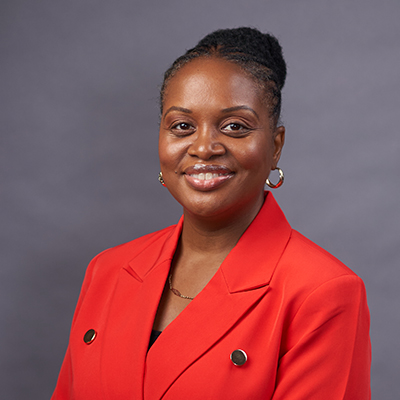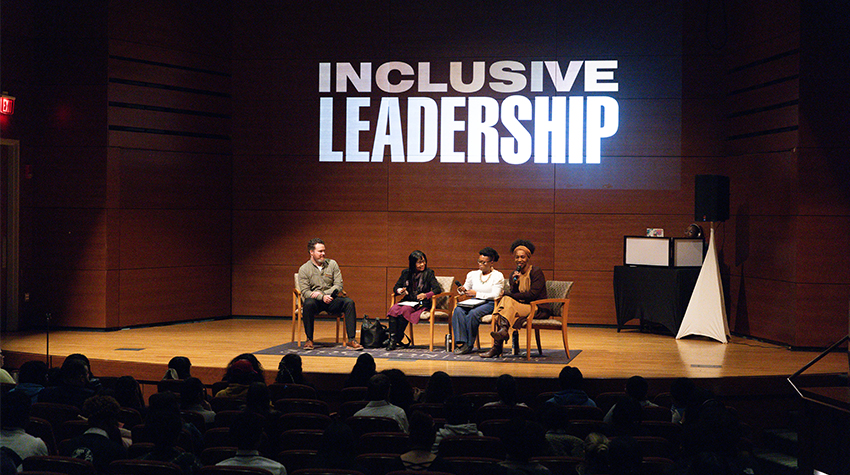Panel Explores Inequities, Distrust in Healthcare
By Esther Lawrence
On the evening of Wednesday, Oct. 30, the Diversity, Equity, Inclusion and Belonging (DEIB) Committees of the Stockton University Schools of Business, Health Science and Natural Sciences & Mathematics hosted a panel discussion entitled “Unveiling the Hidden Complexities of Healthcare: Business, Trust, Innovation and Equity.”
The event, sponsored by AtlantiCare, became an intimate discussion that explored the often-hidden complexities of the healthcare industry between distinguished panelists Philip S. Burnham II, Esq., of Burnham Douglass and Shedia R. Laguer, Ed.D., of the Children's Hospital of Philadelphia.
Due to unforeseen emergencies at AtlantiCare, both of their representatives for the panel, Christian D. Ragland, MPA, and Shanita Alvarez-Crawley, LSW, PMHC, were unable to attend.
Provost Michael Palladino provided opening remarks that set the tone for the discussion and its focus on statewide inequities, saying, “If you think of where we are in New Jersey and across the nation, here we are in the most populated state in the country, yet the inequities in education and basic nutrition and (the lack of) access to healthcare and diverse culturally competent physicians and providers across the healthcare spectrum are among the many reasons why our healthcare outcomes for underserved communities are frighteningly poor.”
Drs. Esther Lawrence and Trina Gipson-Jones moderated this rich panel discussion of the daily healthcare and law career experiences of the esteemed panelists.
The inequities in education and basic nutrition and (the lack of) access to healthcare and diverse culturally competent physicians and providers across the healthcare spectrum are among the many reasons why our healthcare outcomes for underserved communities are frighteningly poor.”Stockton Provost Michael Palladino
Here are some quote highlights from the panel discussion:
LAGUER: It's important to recognize that the Syphilis experiment [U.S. Public Health Service (USPHS) Untreated Syphilis Study at Tuskegee] that occurred right here [The U.S.] happened for 40 years, and that's a long period of time to be able to influence generations when we think about implicit bias and trust. Forty years! I think most folks in this room can think of either themselves or a family member who was alive when this experiment happened. So, the idea that some of these things are ancient history or that they're so far removed from the influence of the way we experience medicine today, the distrust for medicine and healthcare, is a falsehood.
LAWRENCE: It hits closer to home as well. Many of us have family members that are distrustful of the healthcare industry and to their detriment because some of them even pass away as they just don’t trust the hospitals, they don’t trust the doctors. It’s unfortunate. I don’t know how we can ever get past something like that to provide the knowledge and education to family members to take care of themselves rather than letting themselves deteriorate.
GIPSON-JONES: I think the way we start to do that is to train and educate students who are in all aspects of healthcare, including business, the lab sciences and healthcare providers. From the pulpit to the door as they say, everybody needs to be educated on this topic, and they need to be taught about cultural humility and how they go into these spaces and be individuals who can be trustworthy or trusted in the community…and it doesn’t happen overnight.
BURNHAM: You want to make sure that that’s all part of the policies and procedures of your organization because what will happen, and it started, I think, from your first line when you said ‘nurses eat their young,’ well they do, because we’ve had those cases against hospitals and what happens is maybe a nurse see an unlawful practice, right, and she reports that practice to her supervisor. Well, it’s supposed to be confidential, but it never is, and all of a sudden, now they gang up on that nurse. So, if you don’t have the right policies in place in the procedures, then you are going to fail, and that system will fail.
A networking reception followed the panel discussion.

About the Contributor
Dr. Esther Lawrence is the assistant dean for the School of Business, a frequent contributor to the Celebrate Diversity Digest and a longtime member of the Committee on Campus Diversity & Inclusive Excellence.
Social Justice in Higher Education Topic of Conference Panel
By Loukaia Taylor ’22 | SPRING 2024 ISSUE

The second annual Inclusive Leadership Conference in April included a panel discussion with Dr. Donnetrice Allison, chair of the Africana Studies program, and Committee on Campus Diversity & Inclusive Excellence (CCDIE) members Dr. Guia Calicdan-Apostle & Dr. Esther Lawrence.
SETH RICHARDS (CCDIE member and panel moderator): What does social justice mean to you, personally? How does it inform your work here at Stockton?
DR. DONNETRICE ALLISON: It means everything to me. So, coming up as an undergrad at a very similar institution to Stockton University, we were always essentially protesting for what we needed, as there are certain underrepresented communities that don’t often get what we need unless we make others think about it. I think that much of the progress made in this country is because people pushed for it, and so that is what social justice is all about ─ pushing for those things that we need, including all voices and making sure those things happen ─ and so much of that starts with college students. A lot of those things that have happened historically would not have happened without the insistence of young people saying, ‘Hey, wait, we noticed something that's necessary, and we want to make it happen.’ So, what do we do? We organize, and we push. You guys have more power than you realize, and it's so important that we up here help you to exercise that.
RICHARDS: Can you talk a little bit about policy and how we can ensure that diversity, equity and inclusion are prioritized in organizational policy and practice?
DR. ESTHER LAWRENCE: Policies are put in place for a reason, procedures, and so on, but you also have to have benchmarks and metrics when you're creating policies to make sure that you're able to assess that things are getting done and that everyone is felt to be included. You want to make sure that policies are being created so that things are happening equitably, meaning that everyone is going to be able to benefit from those policies. (Policy analysis) should happen within communities, just to make sure that everybody is staying consistent, fair and equitable.
Other Related Articles


